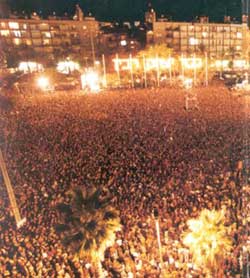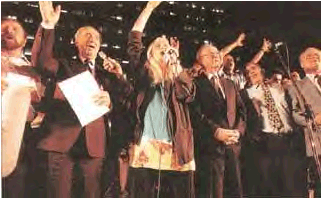 |
The rally
in Kings of Israel Square
|
THE
RALLY FOR PEACE - For most Israelis
old enough to remember it, the night
of November 4th, 1995, has been
burned into memory with unforgiving,
searing clarity – the kind
of instant, dawning shock that sets
in as you realize history has been
made before your eyes, and not for
the better. In every corner of Israel,
hearts stopped at the sound of a
government official’s voice,
choking back tears as he read what
his very soul denied, but his eyes
knew to be true. That a leader could
be gunned down in cold blood, after
standing wordlessly humbled before
a living testament to the ideals
he had fought for, was a crime beyond
measure. But in those few minutes
before grief was on anyone’s
mind – in those few minutes
before any shots had echoed through
Kings of Israel Square – a
celebration of unparalleled passion
had etched itself in time, offering
only peace and hope. They are two
words without tangible substance,
but they are more closely entwined
with the human spirit than any other.
 In
retrospect, it was a miracle in
itself that an outpouring of such
magnitude came together at all.
Several of Rabin’s colleagues
had proposed the idea of an anti-violence,
pro-peace rally to be held in October
1995 – a resounding response
to the increasingly extreme right-wing
rallies which blasted the peace
process as traitorous, and had even
circulated effigies of Rabin himself
in a Gestapo uniform, between rifle
sights. But with the venomous opposition
to Rabin being showcased everywhere
the eye could see, even the most
confident of the rally organizers
were fearful. The possibility of
public humiliation, that the assembly
at Kings of Israel Square in the
heart of Tel Aviv would be a sparsely
attended embarrassment rather than
a triumph, was very real. Every
attempt to promote the rally in
the media or to book major attractions
had met in failure. When Barbra
Streisand turned down an invitation
to perform, the organizers’
anxiety in the days approaching
the rally shifted to resigned pessimism.
In
retrospect, it was a miracle in
itself that an outpouring of such
magnitude came together at all.
Several of Rabin’s colleagues
had proposed the idea of an anti-violence,
pro-peace rally to be held in October
1995 – a resounding response
to the increasingly extreme right-wing
rallies which blasted the peace
process as traitorous, and had even
circulated effigies of Rabin himself
in a Gestapo uniform, between rifle
sights. But with the venomous opposition
to Rabin being showcased everywhere
the eye could see, even the most
confident of the rally organizers
were fearful. The possibility of
public humiliation, that the assembly
at Kings of Israel Square in the
heart of Tel Aviv would be a sparsely
attended embarrassment rather than
a triumph, was very real. Every
attempt to promote the rally in
the media or to book major attractions
had met in failure. When Barbra
Streisand turned down an invitation
to perform, the organizers’
anxiety in the days approaching
the rally shifted to resigned pessimism.
 Around
8 PM on the night of November 4th,
Yitzhak Rabin arrived at Kings of
Israel Square and was immediately
escorted to the front stage by rally
organizer Jean Frydman, who led
him with a giddy excitement that
bewildered the confused Prime Minister.
Stepping out onto the podium, he
was rendered speechless by a sight
beyond anything he could have expected
or imagined. More than 250,000 people
had packed the Square, with many
pouring out onto side streets. Even
in their wildest dreams, Frydman
and others had expected no more
than 50,000. For the first time
in months, Rabin was greeted not
by angry mobs burning his picture,
but a thunderous roar of people
chanting his name. Almost shyly,
he took the microphone – and
instantly launched into an address
of unrestrained passion and eloquence.
Thanking the people first for their
support, he paid tribute to all
who had helped him in the painful
journey to that podium:
Around
8 PM on the night of November 4th,
Yitzhak Rabin arrived at Kings of
Israel Square and was immediately
escorted to the front stage by rally
organizer Jean Frydman, who led
him with a giddy excitement that
bewildered the confused Prime Minister.
Stepping out onto the podium, he
was rendered speechless by a sight
beyond anything he could have expected
or imagined. More than 250,000 people
had packed the Square, with many
pouring out onto side streets. Even
in their wildest dreams, Frydman
and others had expected no more
than 50,000. For the first time
in months, Rabin was greeted not
by angry mobs burning his picture,
but a thunderous roar of people
chanting his name. Almost shyly,
he took the microphone – and
instantly launched into an address
of unrestrained passion and eloquence.
Thanking the people first for their
support, he paid tribute to all
who had helped him in the painful
journey to that podium:
 |
(L-R)
Peres, Miri Aloni, Rabin
|
the
delegates from the Arab countries
who had put aside their differences
for peace ; the courage of the IDF
armed forces who had sacrificed
so much for Israel fighting by his
side ; and a fierce condemnation
of the extremist violence that was
“undermining the foundations
of Israeli democracy.” The
swelling applause and deafening
cheers seemed to galvanize a man
whose ideas had suffered constant
assault from his own people. Normally
known for his stoicism, Rabin broke
character to warmly embrace Israeli
Foreign Minister Shimon Peres, a
former rival-turned-ally for peace.
Israeli singer Miri Aloni then came
onstage to perform the “Song
for Peace”. It was a song
controversial among those who viewed
it as defeatist and submissive,
but on this night it seemed beautifully
perfect. With encouragement from
Peres, the normally gruff Rabin
took a lyric sheet and gamely joined
Aloni in the song. It was the last
time the Israeli people would ever
hear his voice.
 After
watching pop-star Aviv Geffen perform
“To Cry For You”, a
haunting tribute to “those
people who won’t be fortunate
enough to see peace dawn”,
Rabin congratulated the young musician
as the rally drew to a close. He
could not have known the bitter
irony of his compliment. Escorted
by his bodyguards, Rabin walked
to the parking lot. Nobody saw the
outline of ultra-Orthodox fanatic
Yigal Amir hiding under the stairwell.
Amir darted up to Rabin’s
unprotected back and fired three
times. In those few seconds, the
hatred that had already claimed
so many Arab and Israeli innocents
forever ripped away one more life.
After
watching pop-star Aviv Geffen perform
“To Cry For You”, a
haunting tribute to “those
people who won’t be fortunate
enough to see peace dawn”,
Rabin congratulated the young musician
as the rally drew to a close. He
could not have known the bitter
irony of his compliment. Escorted
by his bodyguards, Rabin walked
to the parking lot. Nobody saw the
outline of ultra-Orthodox fanatic
Yigal Amir hiding under the stairwell.
Amir darted up to Rabin’s
unprotected back and fired three
times. In those few seconds, the
hatred that had already claimed
so many Arab and Israeli innocents
forever ripped away one more life.